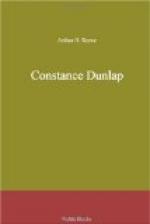And as they worked along gathering the data Constance came to admire Murray more than ever. She worked patiently over the big books, taking only those on which the accountant was not engaged at such times as she could get them without exciting suspicion. Together they dug out the extent of the frauds that had been practiced on the Government for years back. From the letter files they rescued notes and orders and letters, pieced them together into as near a continuous record as they could make. With his own knowledge of the books Dodge could count on making better progress on the essential things than the regular accountant of the audit company. He felt sure that they would finish sooner and that they would have a closer report of the frauds of all kinds than could be uncovered by the man who had been set on the trail of Dodge to discover just how much of the illicit gains he had taken for himself.
Constance became aware soon that whenever she left the office at night she was being followed. She had at first studiously repelled the offers of Murray to see her home. It was not that he had taken advantage of the situation into which she had put herself. He would never have done that. Still, she wished a little more time to analyze her own conflicting feelings toward him. Then, too, several times in the crowded subway cars she had noticed a face that was familiar. It was Drummond, never looking directly at her, always engrossed in something else, yet never failing to note where she was going. That must be, she reasoned, some of the work of Beverley and Dumont.
Murray was now working feverishly. As he worked he found himself feeling differently toward the whole affair. He actually came to enjoy it with all its risks and uncertainty, to enjoy gathering the data which, he should have said, ought really to be destroyed. Often he caught himself wishing that everything had come out all right in the end and that Constance really was his private secretary.
Every moment with her seemed now to pass so quickly that he would willingly have smashed all the clocks and destroyed all the calendars. Association with other women had been tame beside his new friendship with her. She had suffered, felt, lived. She fascinated him, as often over the books they would stop to talk, talk of things the most irrelevant, yet to him the most interesting, until she would bring him back inevitably to the point of their work and start him again with a new power and incentive toward the purpose she had in mind.
To Constance he seemed to fill a blank spot in her empty life. If she had been bitter toward the world for what had happened to her, the pleasure of helping another to beat that harsh world seemed an unspeakably sweet compensation.
At last even Constance herself began to realize it. It was not, after all, merely the bitterness toward society, that lured her on. She was not a woman carved out of a block of stone. There was a sweetness about this association that carried her along as if in a dream. She was actually falling in love with him.




